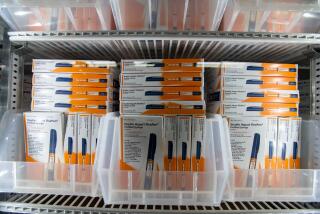Supply Middlemen May Leave Hospitals Ailing
Joe Kiani racked up another victory recently in his quest to get his breakthrough medical invention into more hospitals nationwide. This time a Los Angeles federal court jury awarded his company a $420-million antitrust judgment against a unit of Tyco International Ltd. that he accused of illicitly trying to torpedo his product.
That’s nice for Kiani, although Tyco says it will appeal the verdict. But the collusion between manufacturers and healthcare middlemen that his lawsuit has helped expose, and that keeps worthwhile innovations from being used for patient care, should make the rest of us very nervous.
The middlemen are group purchasing organizations, or GPOs, which claim to save hospitals enormous sums by extracting volume discounts from suppliers. There are grounds for skepticism about these savings. Readers of this space may recall that the prices that the largest GPO, Novation, charges the University of California on its drug purchasing contract have been undercut by hundreds of thousands of dollars by a group of oncologists at UCLA who decided to contract with suppliers themselves.
Kiani’s case highlights a different problem: GPOs have conflicts of interest that may motivate them to sidetrack new products that might threaten the market shares of established manufacturers.
The conflicts rise from the GPOs’ practice of taking fees from manufacturers to push their products to member hospitals. These fees -- kickbacks by any other name -- can range from 3% of a manufacturer’s sales to the GPO to as much as 12% under certain circumstances. They tend to encourage GPOs to protect the big suppliers that can pay them the most. Small, entrepreneurial companies are vulnerable to second-class treatment.
Kiani, 40, founded Irvine-based Masimo Corp. in 1989 to develop a new kind of pulse oximeter, a device hospitals use to measure the oxygen level of a patient’s blood. Masimo’s product improved on the prevailing technology on the market, which is dominated by Tyco’s Nellcor Puritan Bennett Inc. unit. Unlike the existing monitors, Masimo’s devices don’t lose their accuracy when patients move about. This makes them particularly useful in neonatal intensive care units, where the patients are fidgety infants who can suffer severe injury if their blood gets overly oxygenated.
As Kiani detailed in congressional testimony, Premier Inc., the second-largest GPO, and Novation stonewalled him for years, refusing to release member hospitals from their prior commitments to buy Nellcor meters, even though doctors were clamoring for Masimo’s equipment.
The GPOs maintain that they never prevent any hospitals from buying anything they choose, but that’s a dodge. Their contracts customarily require members to buy a high percentage of products from given manufacturers to claim significant discounts. The financial consequences of falling below the percentage are often great enough to keep a hospital from making any change.
Masimo alleged in its lawsuit that Nellcor shared an interest with several big GPOs in barring it from the oximeter market. (It didn’t name the GPOs as defendants, however.)
It took extraordinary pressure to get the GPOs to add Masimo to their supplier rosters, the company said. Premier only added Masimo to its national supply contract in 2002, after the lawsuit was filed. Novation awarded Masimo a contract in July 2003, two days before its CEO was scheduled to testify at a congressional hearing on GPO practices. As soon as Masimo was added to the GPO contracts, its sales to their member hospitals soared. Its overall revenue today is about $100 million a year.
Still, the playing field hasn’t been entirely leveled, Kiani says. He expects to feel a hangover from the GPOs’ prior stonewalling for years, because hospitals only replace capital equipment like oximeters at long intervals.
For example, Cedars-Sinai Medical Center in Los Angeles, a Novation member, wanted to install Masimo devices systemwide a few years ago, after choosing them for its newly renovated neonatal ICU. Its broader plans were thwarted because Novation had bundled Nellcor monitors in a set of 10 items that Cedars was required to purchase on an all-or-nothing basis to be eligible for across-the-board rebates.
“If you used all 10, you got a rebate,” a Cedars administrator told me. “If you used only nine, no rebate.” Except in the new ICU, the hospital had to stick with Nellcor. “We couldn’t make the choice we really wanted to,” the administrator says. Responding to hospitals’ objections to its bundling of high-priced equipment with unrelated products such as rubber gloves and other consumables, Novation later phased out the program.
But it will be a long time before Masimo gets another crack at supplying Cedars. “To adjust to a switch from one vendor to another could take a hospital nine to 12 months,” Kiani says. “So the incumbent has a natural advantage. Then you add the restrictive covenants, and it’s even more challenging.”
The GPOs say they are working to eliminate conflicts of interest; one step ahead of congressional action, they have promulgated their own code of conduct, although critics say it’s vague enough to provide plenty of wiggle room. Some GPOs say they’re going beyond the industry code: Premier says it no longer offers capital equipment like oximeters through national sole-source contracts that favor one company over all others.
But the real problem is that GPOs have morphed from collective purchasing agents for hospitals into profit-making organizations eager to make deals with suppliers. As long as they’re allowed to accept any kickbacks from wealthy manufacturers, more Masimos are bound to get frozen out of the marketplace -- and the ones who suffer will be the patients.
You can reach Michael Hiltzik at golden.state@ latimes.com.
More to Read
Inside the business of entertainment
The Wide Shot brings you news, analysis and insights on everything from streaming wars to production — and what it all means for the future.
You may occasionally receive promotional content from the Los Angeles Times.











